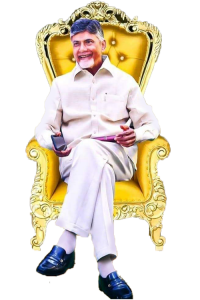
Nara Chandra Babu Naidu, a visionary thought leader, hails from Andhra Pradesh, India, and is endowed with an illustrious political and development career of over 40 years.
Chandrababu Naidu was born into a farming family in a small village, Naravaripalle, Chittoor District of AP, India, in 1950. Since childhood, Chandrababu Naidu has been a very observant and hardworking person and has had an incessant passion for learning. Until class nine, he used to walk 11 km every day to school, and later, he moved to Tirupati to pursue higher education.
He received a bachelor’s degree in 1972 and obtained his Master’s degree in Economics from Sri Venkateswara University, Tirupati. Since childhood, he has got a great appreciation for politics, and he viewed politics as a powerful tool to transform society. Thus, with an impeccable passion for serving the people, he discontinued his PhD studies to foray into politics.
Chandrababu Naidu became the State’s youngest assembly member in 1978 and the youngest minister at 28. He scaled exponentially in the political arena and served the longest term as Chief Minister of undivided Andhra Pradesh from 1995 to 2004 and from 2014 to 2019. Incidentally, he is the longest-serving leader of the opposition too.
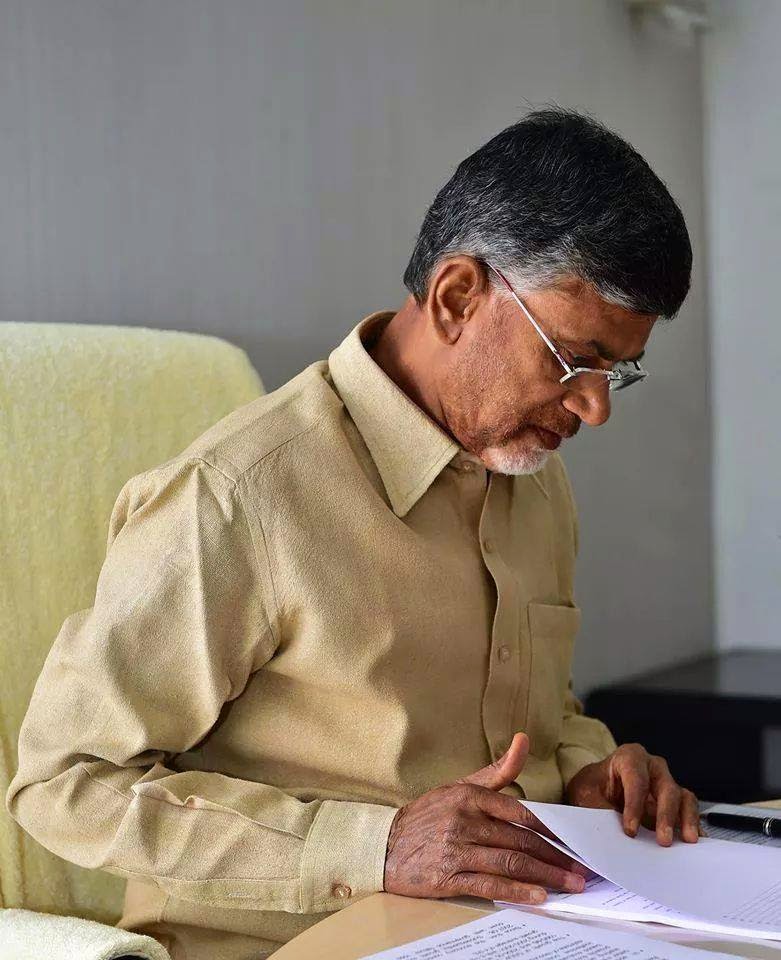
Chandrababu Naidu is one of the most versatile leaders in the Indian political realm and known for his political acumen and zeal for reform and development. During his regime in 1994, Mr Naidu was identified as a tech-savvy Chief Minister with a managerial style of functioning. However, with his successful pathfinding interventions in socioeconomic development coupled with efficient policymaking abilities, he is often considered a professional Chief Executive rather than a political Chief Minister.
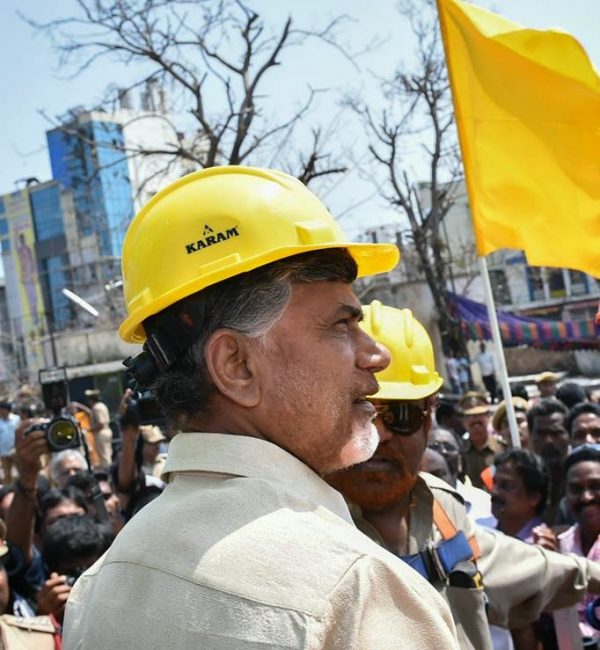
His flair for development is unabated, and he relentlessly strove for the exponential and sustainable growth of the State, whether or not he was in power. He introduced several reforms in various sectors as Chief Minister, focused on transformation rather than information. The reforms he undertook in a bid to achieve transparency and efficiency have yielded phenomenal results.
Chandrababu Naidu unleashed a spree of programmes and schemes supported by robust policies to overcome socioeconomic upheavals of unified Andhra Pradesh. With his dynamism and vision, he prioritised good governance and infrastructure development and exhibited the will to invigorate the State’s economic climate. Mr Naidu has been rightly acclaimed as the 21st-century architect of pro-market reforms in Andhra Pradesh.
Chandrababu Naidu, while re-engineering the very concept of political leadership, struck a balance between urban and rural development, with numerous programs for the wholesome development of the State.
Chandrababu Naidu quickly realised that the global political and socioeconomic space is undergoing rapid growth alongside developing unique and dynamic challenges and opportunities. Therefore, he believes that the applications of science and technology can aptly address all such changes.
Chandrababu Naidu was credited with many pioneering reforms in the administration, alluding to growth, development, and governance to further his development agenda. For example, Chandrababu Naidu set up a task force on ‘Good Governance’ and brought out a White Paper on ‘Governance and Public Management’ indicating many goals and initiatives, such as the establishment of a Centre for Good Governance, accelerated decision-making process, e-governance, and citizens’ charters, among others.
Statutorily empowered Water User’s Associations were created to observe participatory irrigation management practices, doing away with the government’s traditional management of irrigation sources.
Some of the significant reforms are the scheme for employee performance-oriented transfer of employees and arranging a direct interface between schools and parents through creating parent-teacher associations.
Convinced by the proactive approach and support from Mr Naidu, many other global IT companies such as IBM, Dell, Deloitte, Computer Associates, and Oracle have started their activities in Hyderabad.
During his tenure, software exports from Hyderabad recorded a peak of $1 billion, and Hyderabad became the fourth-largest exporting city in the country. By 2013–14 exports had grown more than ten times, employing about 320,000 people working in Hyderabad’s IT and ITES fields alone.
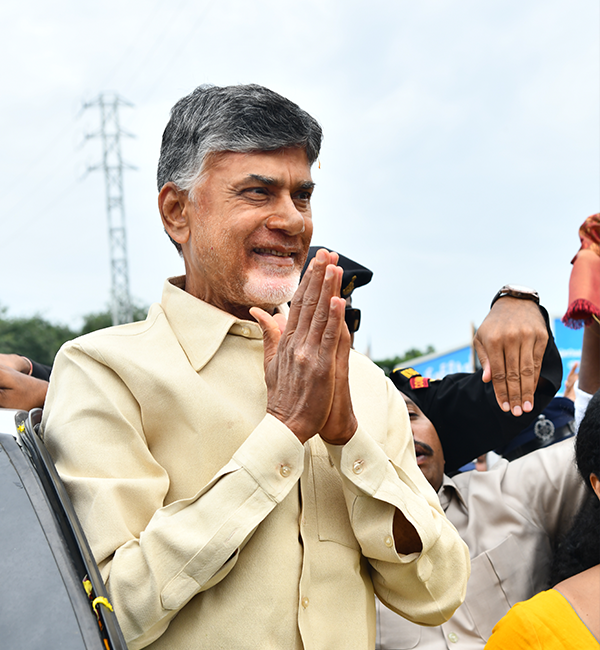
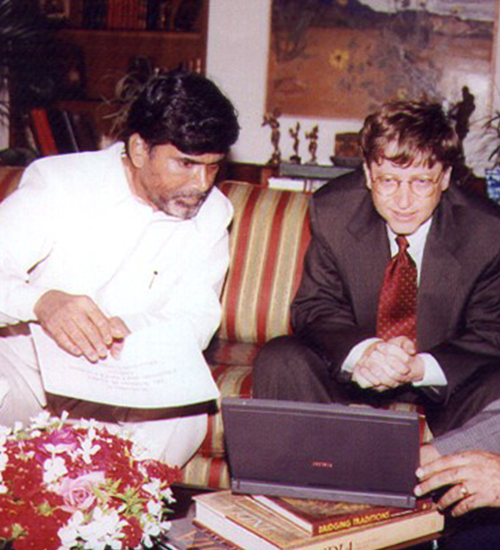
Chandrababu Naidu was instrumental in implementing several programs to ameliorate the plight of different sections of society living in villages focusing on schemes targeted towards particularly vulnerable groups such as Gas stoves (Deepam and Roshini Schemes) for rural women and religious minorities, Traditional tools and implements (Adarana Scheme) for people of traditional occupations, and many other schemes.
Mr Naidu launched the Janmabhoomi Programme (Motherland) in 1996, aiming at the all-round development of the rural and urban communities with economic, social, and cultural elements while bringing government to the people. The programme calls for community participation at the micro-level planning for the reconstruction and revitalisation of the society. The Janmabhoomi program evoked an overwhelming response and led to the massive creation of durable community assets.
The Chief Minister’s Employment of Youth (CMEY) programme, another successful programme, was unveiled to empower youth by providing skill and entrepreneurship training and arranging institutional finance for self-employment and further employment generation.
During the same period, Mr Naidu started a massive program called the ‘Clean and Green Campaign’ to highlight the need for cleanliness and environmental protection by undertaking the plantation.
Chandrababu Naidu launched the Food for Work programme in 2001 to provide gainful employment to wage seekers by offering food grains for the labour rendered. Chandrababu Naidu successfully negotiated 3.1 million tonnes of rice from the Government of India for the Food for Work programme in Andhra Pradesh.
The Neeu Meeru (Water & You) program, promoting watershed activities in rural areas and various water conservation measures in urban areas, inculcated a sense of responsibility among the citizens.
Chandrababu Naidu started a poverty-reduction program called Velugu in 2000, the single largest of this kind in South Asia, with the social empowerment agenda implemented through women’s self-help groups, addressing unemployment, credit access, social inequalities, oppression, and particularly, gender-based violence, among others. The programs he initiated across the cross-section, including women, youth, farmers, differently-abled persons, and so forth, earned praise from many global leaders.
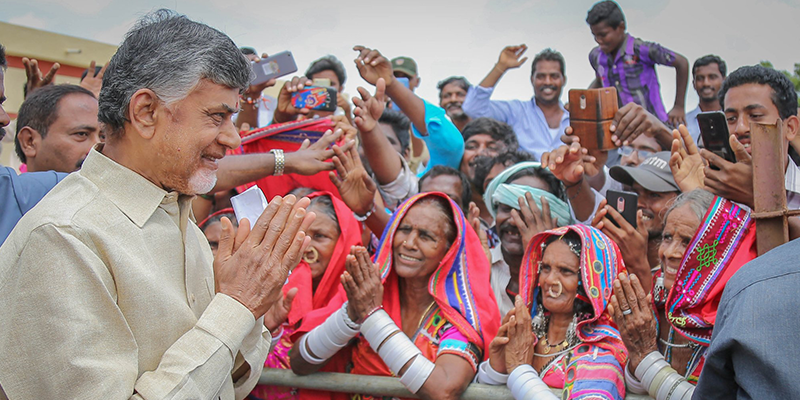
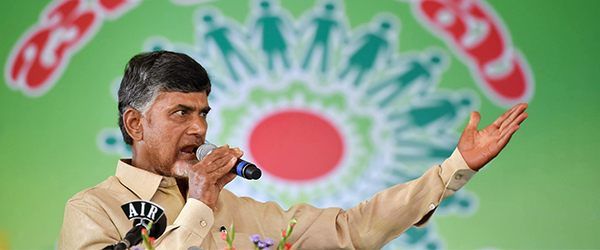
To circumvent the crisis of soaring prices of vegetables and fruits, Mr Naidu established Rythu Bazaars (Farmers Market) across the State in 1999 by providing a direct interface between farmers and consumers, eliminating the middlemen. The scheme was a big success; it provided a remunerative price to the farmers and enabled consumers to get quality produce at reasonable prices.
In his latest stint as Chief Minister of the cash-starved residuary State of Andhra Pradesh from 2014 to 2019, he had to focus much on several structural issues that emerged due to state bifurcation.
Pattiseema Lift Irrigation Project, India’s first major River Linking Project connecting River Godavari and Krishna, was executed. This project created a huge irrigation potential by diverting 80 TMCs of water 174 km away into river Krishna and eventually into water-starved Rayalaseema.
Chandrababu Naidu, who is described as an IT genius among politicians, introduced e-governance to the public. Sectors like electronics and manufacturing have been encouraged, and technology has been infused into education, health, infrastructure, finance, and governance. In this process, he attracted the attention of celebrities not only in India but worldwide.
Chandrababu Naidu is a compelling force in using information technology. He successfully highlighted and demonstrated its use to prepare for a smooth transition to an information society and knowledge economy. The IT-enabled interventions facilitated quick decision-making within the government and provided a better quality of governance to the common man.
He was instrumental in transforming Hyderabad, the “City of Pearls,” into an IT hub. With the inception of Naidu’s brainchild, the Hi-Tech City in Hyderabad, in 1998, an IT revolution was triggered. Mr Naidu persuaded and infused confidence in the IT giant Microsoft to establish their R&D centres in Hyderabad, consequently Raheja Mindspace; an IT hub employing over 80,000 people was established in 2003, and Microsoft had a monumental beginning with a software development centre in Hyderabad in 2004, the second such centre outside Seattle, US.
Convinced by the proactive approach and support from Mr Naidu, many other global IT companies such as IBM, Dell, Deloitte, Computer Associates, and Oracle have started their activities in Hyderabad.
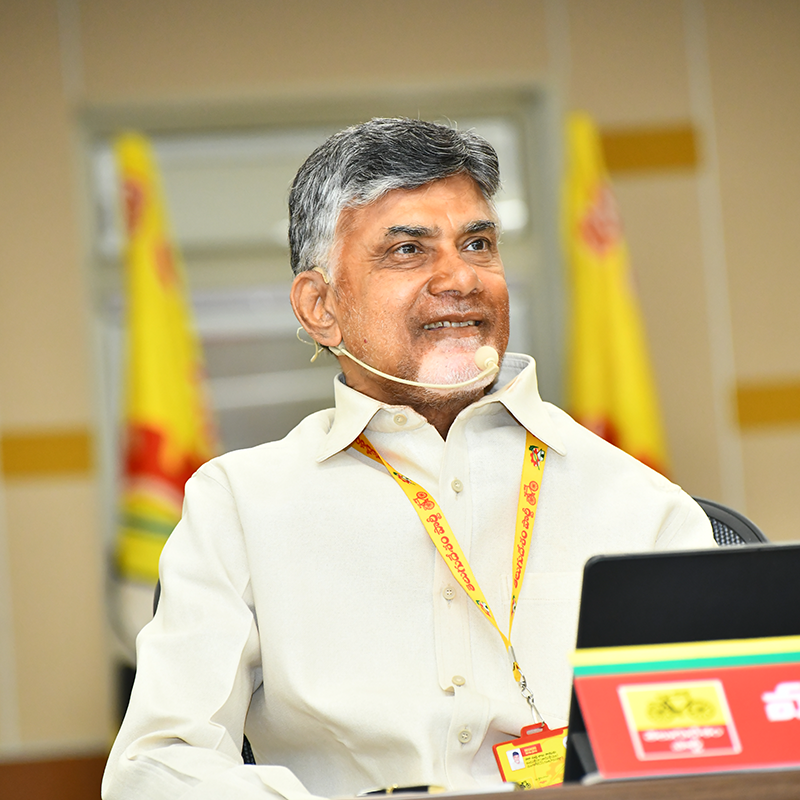
During his tenure, software exports from Hyderabad recorded a peak of $1 billion, and Hyderabad became the fourth-largest exporting city in the country. By 2013–14 exports had grown more than ten times, employing about 320,000 people working in Hyderabad’s IT and ITES fields alone.
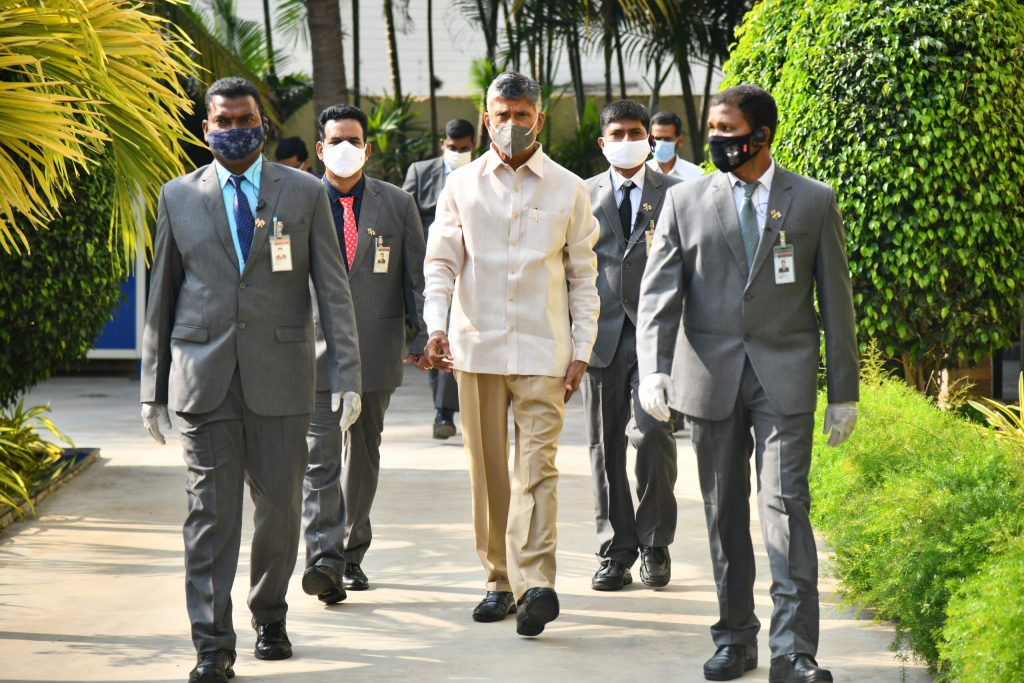
A significant attribute of Chandrababu Naidu’s regime was the importance attached to governance. He was the first politician in the country to talk about vision 2020 for the holistic development of a state or country.
Vision 2020 envisions that the government must be simple, transparent, accountable and responsive and ensures people’s participation in the governance of the State.
Chandrababu Naidu efficiently puts the vision into practice without falling prey to existing glitches and pitfalls. He ensures that his vision is followed by action by defining clear goals, outlining a strategy, and empowering each member to act upon it.
In 1999, Chandrababu Naidu produced a vision statement called “Andhra Pradesh Vision 2020” in collaboration with US consultants McKinsey & Company. The vision ingrained various goals and objectives to be achieved by 2020. The vision focused on 19 Primary Growth Engines in all three subsectors, and many actionable activities were planned to achieve the objectives.
In 2001, ahead of many developed countries, AP became the first State to provide paperless and speedy online services through e-Seva Centres; the services include all government information, utility bills, banking services, issuing birth and death certificates, and so forth.
Soon, the economic reforms and new policy initiatives by Mr Naidu helped Hyderabad become an IT Hotspot of India in 2002, ranked the number one city in the country for competitiveness, and became the most sought-after destination for investment in India.
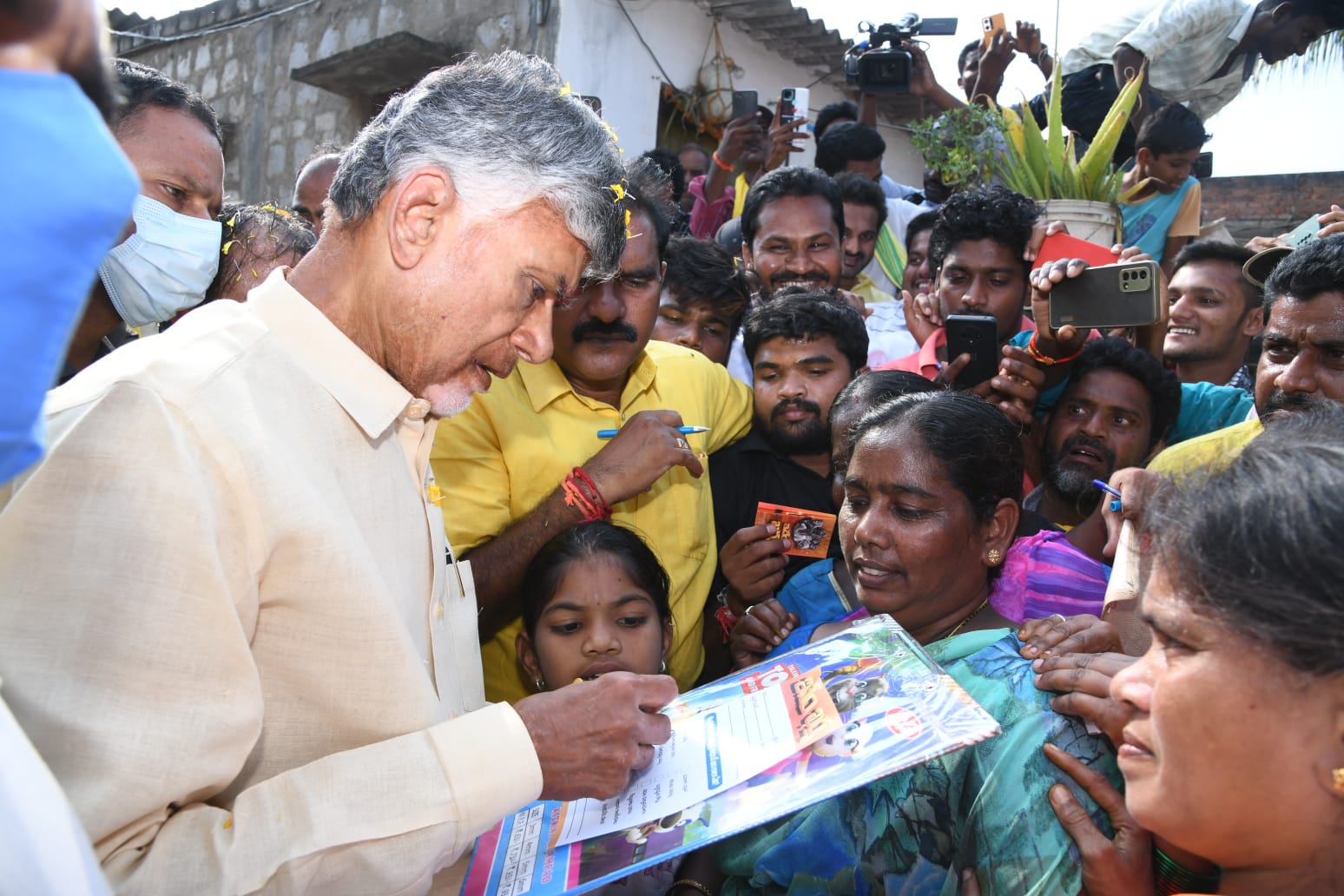
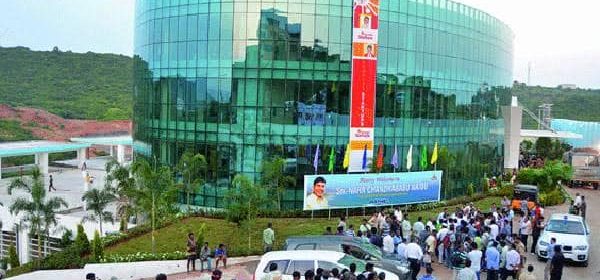
Determined to impart the benefits of new technologies emerging in the biotech and life sciences sector to the common man, Mr Naidu took out the country’s first exclusive policy for biotechnology in 2001, and he transformed the bulk drug capital into a happening biotech destination, catalysed by the plans, policies, and activities.
Chandrababu Naidu established a world-class biotechnology park (aka) Genome Valley in Hyderabad in 1999 to accelerate Research & Development. The Park housed over 200 biotech companies, including Bharath Biotech, the forerunner of today’s potential COVID-19 vaccine.
In anticipation of the future growth trajectory of the city, he emphasised attracting investment in providing infrastructure. Infrastructure is a lifeline for any economy to function efficiently, and a suitable level of infrastructure is a must for the growth and development of all economic sub-sectors. Chandrababu Naidu succeeded in his endeavour and executed several infrastructure projects through partnerships.
A world-class greenfield Airport project at Shamshabad was initiated on 5,495 acres. In addition, many more projects were conceptualised and rolled out, including Outer Ring Road, Singapore Township (an integrated township with 2080 apartments), IT parks, five-star hotels for the delegates’ meetings and accommodation, and the HITEX International Convention and Exhibition Centre.
Andhra Pradesh has become the first State in the country to have a multi-modal transport system (MMTS) with an operational length of 43 KM, integrating the railway infrastructure with the road network. The then Deputy Prime Minister L K Advani, while inaugurating the project in 2003, appreciated the perseverance of chief minister Chandrababu Naidu in making the project a reality.
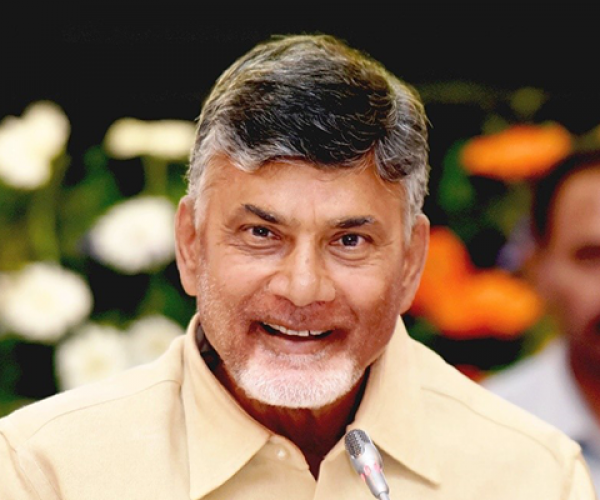
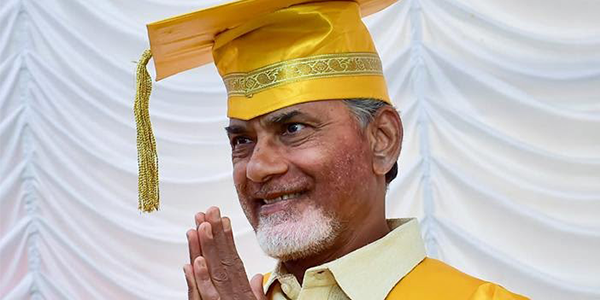
The influence of technology in today’s world is so pervasive, and technology plays a pivotal role in economic development. Recognising the importance, Mr Naidu promoted Technical Education and facilitated the establishment of Engineering colleges, raising the number from 30 to over 250 in quick succession. He founded IIIT in 1998 in Hyderabad under a public-private partnership model, the first of its kind in the country, and the National Academy of Construction in 1998. Setting up the prestigious and globally acclaimed management institution, the ISB, in 2001 is testimony to his commitment to education and technology. Consequently, many more institutions, such as Agriculture, Horticulture, and Veterinary Universities, came into existence.
Driven by the motto, People-first, Mr Naidu, using technology, unveiled a powerful initiative, “Real-Time Governance (RTG),” in 2017 as a functional arm with a 360-degree life cycle approach. The RTG provided an efficient and seamless public service delivery system benefiting over 50 million citizens and enabled the government to monitor and review infrastructure projects, crime and incidents, weather, and natural calamities across the State in real time. Unsurprisingly, the RTG initiative garnered global recognition and was rewarded with Hitachi Transformation People’s Choice Award.

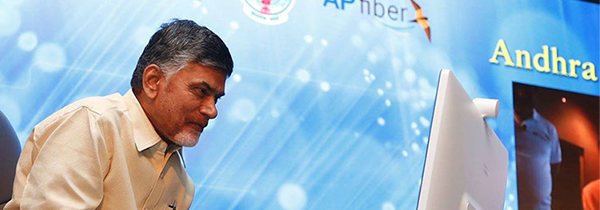
Andhra Pradesh State FiberNet Limited (APSFL) project was initiated in 2015 to realise the vision of Digital AP by providing affordable, end-to-end broadband, cable television, and phone connectivity in AP. As a result, about 22,500 km (14,000 mi) of aerial optical fibre cable was laid across the State, there are over 8,50,000 users, and about 3150 schools, universities, and government offices are also now connected to the network.
Mr Naidu promoted investment and industrial development in a big way and ranked number one consistently in Ease of Doing Business in the country from 2015 to 2019. With subtle policies and forging partnerships, he succeeded in garnering global investment and attracted many MNCs such as Google, Kia Motors, Xiaomi, Foxconn, HCL, Hero Motors Corp, Wipro, and Tech Mahindra, among many others. Installing IoT-enabled LED street lights, Paperless E-Cabinet, Inexpensive Solar Energy, and thousands of CC cameras for surveillance across the State are some of many reforms rendered by Naidu in the new State of AP.
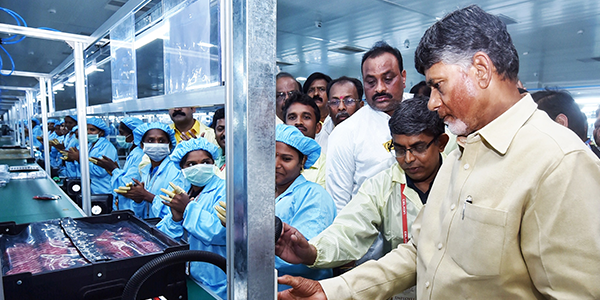
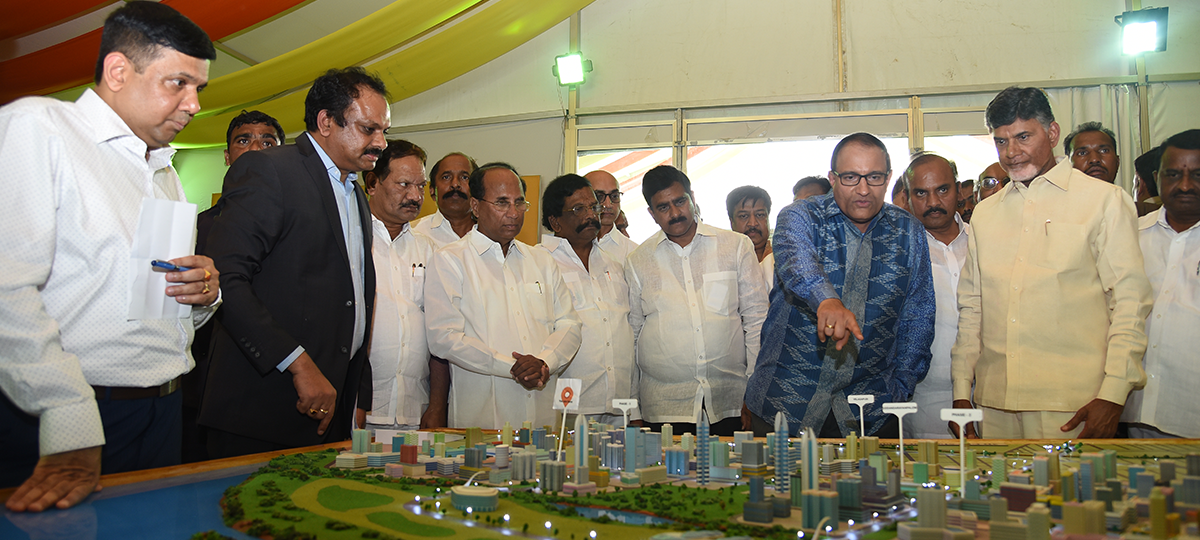
When the State reorganisation of Andhra Pradesh took place in 2014, the residuary State of Andhra Pradesh state was left with no State capital, and to fulfil the aspiration of the people of AP, a world-class futuristic city Amaravati’, keeping up with modern trends, was planned. With his forward-thinking and innovative leadership, about 34,281acres of land was procured through land pooling and got prepared the Masterplan by M/s Surbana Jurong Singapore, one of the best planners in the world to make Amaravathi a top modern city in the world. Over 70 percent of the construction was completed by the time of the power change in 2019.
Mr Naidu made a pioneering attempt to universalise Natural Farming practices by reaching 6 million farmers and converting 8 million hectares into natural farming fields through Climate Resilient Zero Budget Natural Farming (CRZBNF) program in 2014.
Zero-budget farming is a set of farming methods with zero investment. Emulated by the positive experience of Andhra Pradesh, Union Government incorporated ZBNF in the 2019-20 budget as a strategy to double the farmer’s income.
The initiative also got global recognition and was declared one of the top 10 projects in the world by the Paris Peace Forum in December 2018. Mr Naidu also got the rare honour of addressing a special session organised by the United Nations Environment Programme, and UNEP has pledged to support scaling out ZBNF to 6 million farmers across the State by 2024.
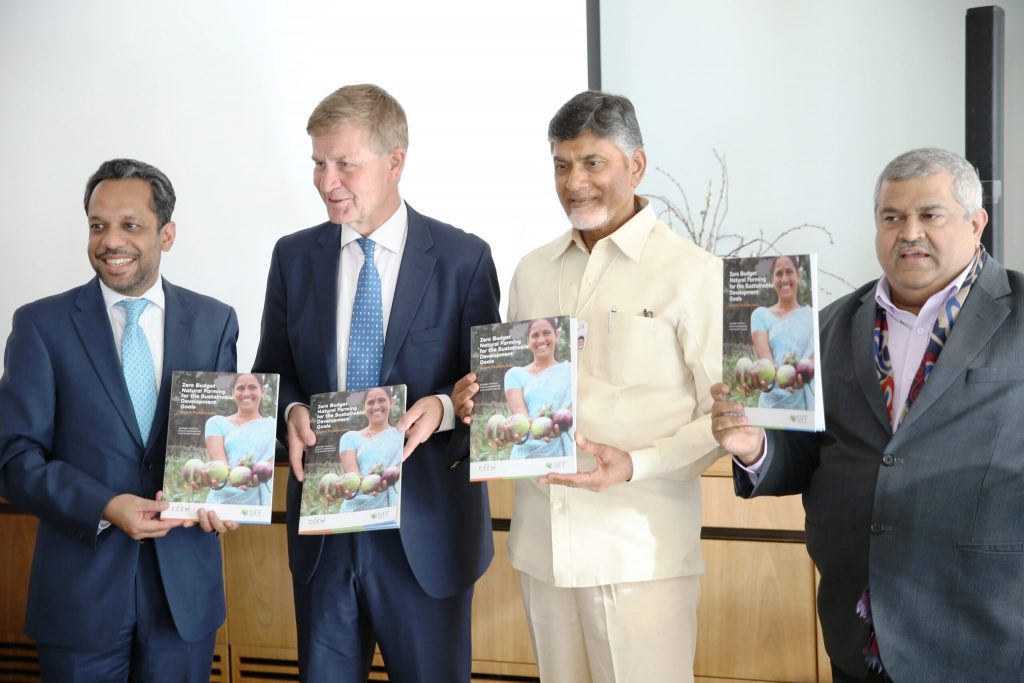
The focused and holistic multisectoral approach with strong determination enabled the State to consistently achieve a double-digit growth rate of 10.52 percent from 2014 to 2018 for four years.
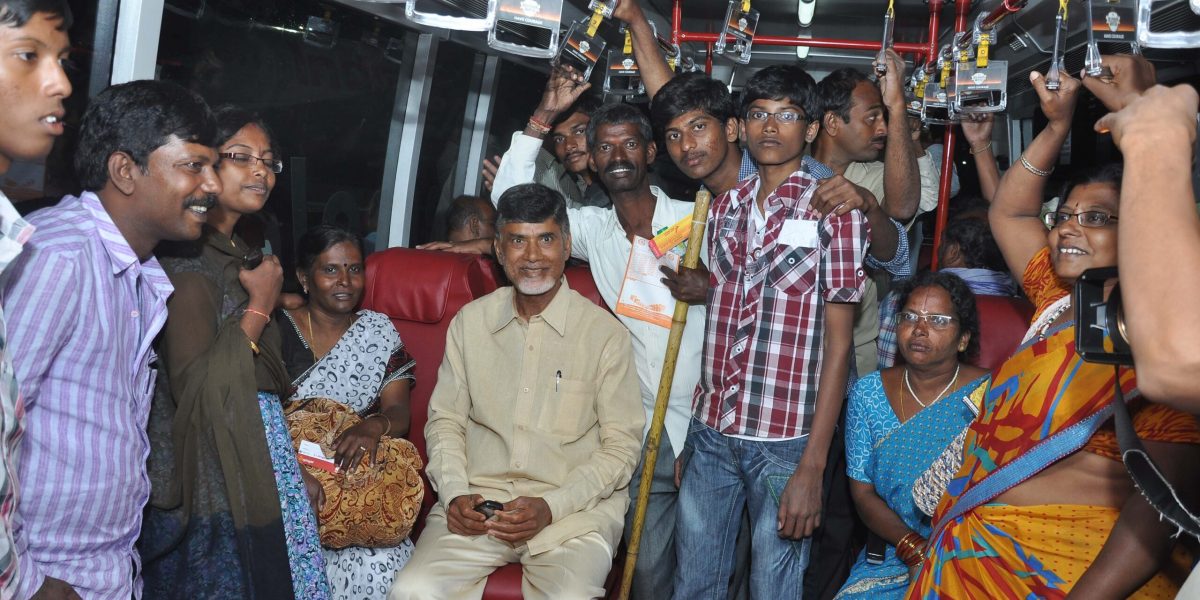
When Cyclone Hudhud devastated Visakhapatnam and surrounding districts in 2014, the pre-emptive action avoided serious life loss. Normalcy could be restored in just eight days, with colossal proportions of restoration work turned out incessantly, spearheaded by Mr Naidu. Converting the crisis as an opportunity, the Visakhapatnam city was soon redesigned and converted into a garden city.
The change in the political landscape in 2019 pulled him back as the current leader of the opposition. Yet, regardless of the titles and positions of power, his relentless passion for serving society and contributing to nation-building propelled him to establish a strategic collaboration of thought leaders from distinct walks of life to formulate public policies for the nation’s welfare.
Chandrababu Naidu is a statesman par excellence, and his diplomatic style has won recognition from world leaders such as Mr Shinzo Abe, the Prime Minister of Japan, and Mr Lee Hsien Loong, the Prime Minister of Singapore. He also won the West’s support, including former CEO and Chairman of Microsoft, Mr Bill Gates, and former Prime Minister of the United Kingdom, Mr Tony Blair.
He also helped forge partnerships and friendships, cementing Andhra Pradesh’s hegemony with leading countries like China, Japan, Singapore, Russia, the United States, Malaysia, Sri Lanka, and the United Kingdom.
Aparisim “Bobby” Ghosh of the American news magazine ‘Time’ commented, “In just five years, he has turned an impoverished, rural backwater place into India’s new information-technology hub,” and the magazine rightly named him South Asian of the Year.
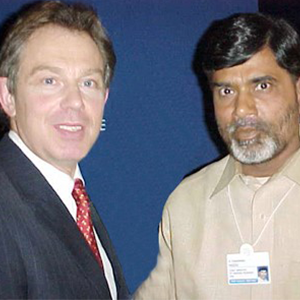
Named “Business Person of the Year” by The Economic Times,
The Governor of Illinois created a “Naidu Day” in his honour.
He was named “South Asian of the Year” by Time magazine,1999, USA.
Voted “IT Indian of the Millennium” in a poll by India Today and 20:20 Media, 2000.
He was described as one of the “Hidden Seven working wonders around the world” in 2001, by Profit, a monthly magazine published by Oracle Corporation, US
Awarded “Aadarsh Mukhyamantri Puraskar” (Model CM Award) by Bharatiya Chatra Sansad in partnership with MIT School of Governance in 2016.
Awarded “Transformative Chief Minister Award” by US-India Business Council (USIBC) at West Coast Summit in the Silicon Valley in May 2017.
“Golden Peacock Award” for Leadership in Public Service & Economic Transformation, instituted by the Institute of Directors (IOD), India – 2017
“Global Agriculture Policy Leadership Award” by Indian Council of Food and Agriculture (ICFA), 2018.